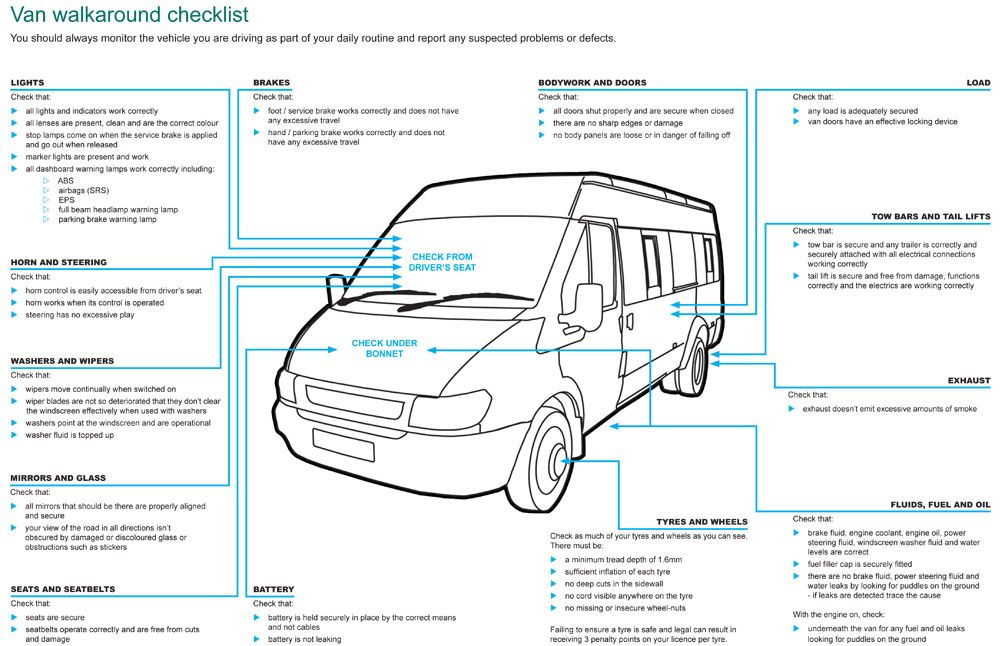
There are a few things to know if you use a van for business reasons be it as a courier owner driver or commercial van driver. This includes important safety and travel information, as well as financial benefits.
Ferry / Tunnel Travel
If you are using a van for business, you must use the correct ferry or tunnel service for light commercial vehicles (LCV). If you are carrying commercial goods or equipment on any leg of a sailing, a freight booking is required. In the case of Eurotunnel, a special Vans on Passenger (VP) service with specific advantages for van drivers is available.
Insurance
You must have vehicle insurance to drive a van. Make sure your insurance company knows that your van is for business use as this will affect your policy.
Additional classifications also apply to vans for business use - carriage of own goods, carriage of goods for hire or reward and haulage coverage.
Speak to your insurer for more information.
Weight Limit
Every van has a 'design gross weight' (also known as 'gross vehicle weight' or 'laden weight'). This is the maximum weight it can weigh when it's loaded. It is unsafe to overload your van and may result in a fine or court summons if you are caught exceeding the maximum permitted axle weight.
Van Loading
Not every van has a bulkhead therefore it is important to ensure that your cargo is loaded correctly and secured with the correct restraints like netting and straps. Keep a hi-vis jacket and toe cap boots with you too so that you can load and unload safely.
Driving Time
The amount of time you can drive your van for depends on the weight of your van (not exceeding 3.5 tonnes) and the country you are driving in. In the UK, GB domestic driving rules state
- You can only drive for a maximum of 10 hours per day
- You can only be on duty for 11 hours (including van loading)
Also, if you drive your van for more than 4 hours a day or go beyond 50 km from your base, you must abide by the Working Time Regulations, which outline the hours you can work, breaks you must take and the requirement to keep a written record of your driving hours. Again, exceeding daily driving limits could result in a fine of up to £300.
Vans & Tax Benefits
"All featured vans are classed as light commercial vehicles (LCV's), and all LCV's enjoy a standard Benefit in Kind liability irrespective of their purchase price or how many accessories you fit. If you are a tax payer in the 40% tax bracket, driving a Mercedes Sprinter or Peugeot Bipper for example, you could save in the region of £4,000 every year on Benefit in Kind tax payments compared with a similarly priced passenger car." Vanarama.co.uk
Speak to your accountant or tax advisor for more information on how you could benefit.
 Roadside Checks
Roadside Checks
As is the case with HGVs, commercial van drivers can be asked to stop by the police or DVSA (Driver & Vehicle Standards Agency) officer. They have the power to carry out spot checks on your van and issue prohibitions if necessary. This prevents you from driving until you rectify the problem with your van. Fixed penalties can also be issued if you commit an offence.
Popular Commercial Van Ferry Routes
Take a look at our 'Travel by Van' ferry schedule pages for some fantastic van rates on popular European ferry routes



 United Kingdom
United Kingdom Republic of Ireland
Republic of Ireland Polska
Polska România
România Republica Moldova
Republica Moldova Российская Федерация
Российская Федерация Украина
Украина Республика Беларусь
Республика Беларусь Литва
Литва Латвия
Латвия Эстония
Эстония Deutschland
Deutschland Schweiz
Schweiz Österreich
Österreich Lichtenstein
Lichtenstein Belgien
Belgien Luxemburg
Luxemburg Magyarország
Magyarország Česká republika
Česká republika Slovenská republika.
Slovenská republika. España
España Italia
Italia Bulgaria
Bulgaria









